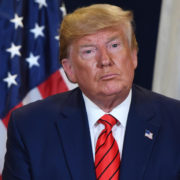THE impeachment trials to remove President Donald J. Trump from office already started this week in the House of Representatives, pursuant to the provision and mandate stipulated in the United States Constitution.
Before we get lost in the seemingly parallel but divergent universe — the televised impeachment proceedings and the toxic attacks launched by Trump via his twitter feed against the witnesses who have stood before the House Intelligence Committee chaired by Rep. Adam Schiff – let us recover our bearings and go back to how this started and what the rule of law really says.
To REVIEW, an impeachment proceeding is the formal process by which a sitting president of the United States may be accused of wrongdoing. It is a POLITICAL process and NOT a criminal process.
At the heart of this process is making elected officials accountable to the people, and to expel from office those who violate the sacred oath they took to preserve, protect and defend the Constitution. Aside from the president, the vice president and all civil officers of the United States can also face impeachment.
The proceeding’s formal opening of impeachment inquiry was announced by House Speaker Nancy Pelosi on September 24, citing the 45th President of the United States’ “betrayal of his oath of office, betrayal of our national security, and betrayal of the integrity of our elections”. The full House voted on October 31 to authorize the inquiry.
After the ongoing House Intelligence committee investigation, the process then moves to the Judiciary Committee which may draft articles of impeachment — the list of charges against the president.
Despite so many allegations of crimes and impropriety before and after Trump took office that paved the way for the Mueller investigation and the civil/criminal cases filed in court against him, it appears that the Democratic-led House is focusing on the complaint filed by a whistleblower about a controversial call between Trump and Ukraine President Volodymyr Zelenskiy.
From this controversial call and Trump’s other actions surrounding it, like making his personal attorney Rudy Giuliani establish backchannel dealings with Ukraine’s leadership, it has been alleged that Trump abused his power as president and the resources accorded to his position of trust with the taxpayers’ money, and used it as leverage to get something of value to him, personally, in exchange for the release of military aid to Ukraine that he withheld until his demands were met — a formal announcement to the public of an investigation into Trump’s possible opponent in the 2020 U.S. Presidential Election, former Vice President Joe Bided, and his son Hunter.
The Constitution stipulates that the President may be impeached and removed from office because of “treason, bribery, or other high crimes and misdemeanors.”
In this early stage of the impeachment proceedings, “House Speaker Nancy Pelosi has sharpened the focus of the Democrats’ impeachment case against President Trump recently, accusing the president of committing bribery when he withheld vital military assistance from Ukraine at the same time he was seeking its commitment to publicly investigate his political rivals,” according to a report by the New York Times.
What is bribery?
Cornell University’s Legal Information Institute defines bribery as “the offering, giving, soliciting, or receiving of any item of value as a means of influencing the actions of an individual holding a public or legal duty.”
“This type of action results in matters that should be handled objectively being handled in a manner best suiting the private interests of the decision-maker. Bribery constitutes a crime and both the offeror and the recipient can be criminally charged.”
“Proof of bribery requires demonstrating a ‘quid pro quo’ relationship in which the recipient directly alters behavior in exchange for the gift. Because the relationship does not occur directly enough, campaign donations from corporations or individuals to political candidates do not constitute bribery.”
“Another element of proving bribery includes proving intent to influence the discharging of another’s official duties. Some statutes also require proof that both parties understand and agree to the arrangement. Attempts to bribe exist in common law and under the Model Penal Code, and often the punishment for attempted bribery and completed bribery are identical. Solicitation of a bribe also constitutes a crime and is completed regardless of whether the solicitation results in the receipt of a valuable gift.”
ON TO THE IMPEACHMENT TRIALS… Ever wonder why Trump and his cohorts would not allow their key officials to testify under oath in the impeachment trials? Ever wonder why he would be intimidating, badmouthing the few courageous officials who would speak up and testify against Trump, which corroborates the allegations and concerns presented by the whistleblower? Ever wonder why Trump and his cohorts would openly defy the WHISTLEBLOWER ACT by demanding to know the identity of the whistleblower?
THINK ABOUT IT…
* * *
Gel Santos Relos has been in news, talk, public service and educational broadcasting since 1989 with ABS-CBN and is now serving the Filipino audience using different platforms, including digital broadcasting, and print, and is working on a new public service program for the community. You may contact her through email at gelrelos@icloud.com, or send her a message via Facebook at Facebook.com/Gel.Santos.Relos.







